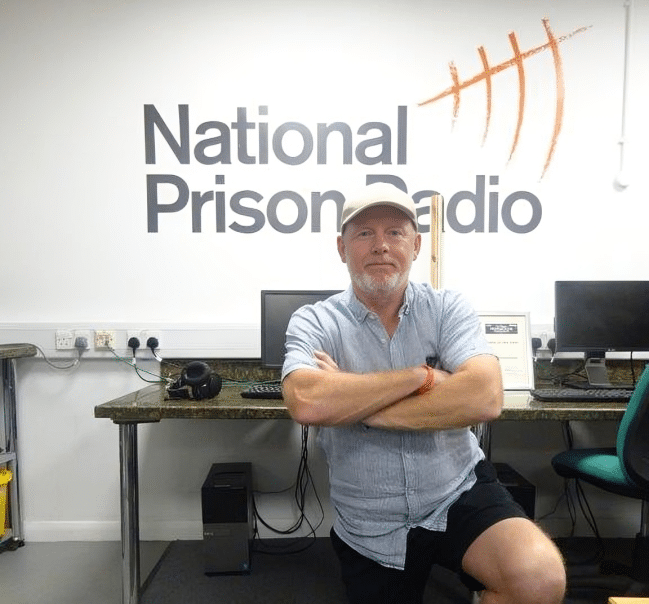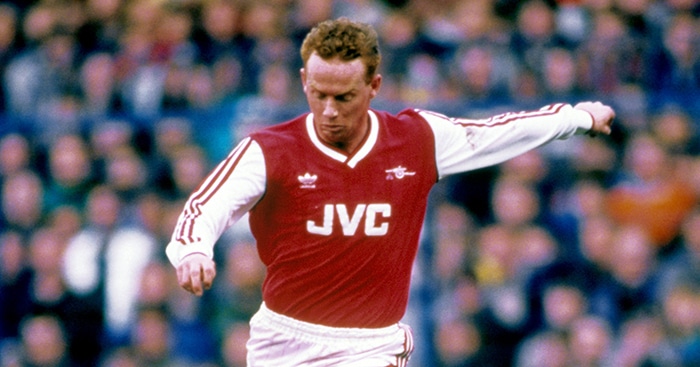Latest News

Tweet us@PrisonRadioUK

Former professional English Footballer and Media Pundit Perry Groves recently visited HMP Brixton to talk to National Prison Radio presenter ‘T’ about his struggles with alcoholism and the mental breakdown that led him to seek help at Tony Adam’s rehab facility, Sporting Chance.
Perry Groves began his professional football career at Colchester United where he quickly made a name for himself, however it was his move to Arsenal in 1986 that truly defined his career.
Perry made 150 appearances for Arsenal between 1986-1992. He played alongside footballing legends, Tony Adams, Ian Wright and Paul Merson. He was a part of the Arsenal squad that famously clinched the first division title in 1989 with that unforgettable last-minute goal at Anfield.
He told National Prison Radio presenter T how much it meant to him to play for Arsenal:
“For me to be on the pitch was mind blowing and I still gets shivers and chills down the back of my spine because, when Michael Thomas scores the iconic winning goal, I’m out on the right wing looking across, and it’s just like I’m basically, I’m a fan, but I’m a fan on the pitch… me scoring for Arsenal was a feeling out of this world because I knew I was good and I knew I was good enough to be a professional, but in my wildest dreams, I didn’t think I’d play for Arsenal.“
Beyond the field, Perry has made a successful career as a pundit, author and ambassador for the sport. He now makes regular appearances on TalkSport, sharing his expertise worldwide with fans. Perry is also involved in charitable work, particularly supporting initiatives for mental health awareness and youth development programs.
However, after retiring from professional football, Perry faced significant challenges behind closed doors. He has recently opened up about his struggles with alcoholism and has been using his platform to raise awareness and support others facing similar issues.
At the age of 30, Perry had to give up his dream football career due to injury and this hit him hard:
“I still had my network of family, I still had network of friends around me, but my life, everything was empty. I didn’t have football. Yeah, my whole week was geared around football. So that was pretty scary when you pack it in. Basically I had to go and earn money. I had to go and get what I would call a proper job in like the real world.“

Perry explains that for a long time, he was in denial about his relationship with alcohol. It was part of the football culture to drink heavily:
“If you won on the Saturday and then you trained hard on the Tuesday, you went out and basically you just went on bang on the lash for all day Tuesday, maybe, Wednesday.”
He says when he looks back now, he knows it’s not normal for your life to revolve around alcohol. He often suffered with post-drink paranoia and ‘the fear’ where after a heavy night of drinking, he would ask himself, “what have I done, who have I upset, what’s happened?”, but because he was drinking with people who did the same things, everybody thought it was normal.
His drinking eventually led him to being pulled over for drink driving where he was 3 times over the limit. He says he almost went to prison. However, the first thing he did when he came out the Magistrates court was go for a drink with his mates who also had been done for drink driving previously, he says they all thought it was ‘hilarious’ as the culture was so normalised.
Sadly, last January Perry had a mental and physical breakdown. He told National Prison Radio that his body and brain shut down completely.
He said it was his step-sons who said to him, ‘you’re a functioning alcoholic’, however, he wouldn’t accept it. His idea of what it was to be an alcoholic was different to his reality:
“I’m not a functioning alcoholic. I don’t drink wine. I don’t drink spirits. I just drink beer, lager. That’s your illness telling you that you’re alright. I tried to prove myself that I wasn’t alcoholic. I used to go out and have two, three pints and go home. Or I wouldn’t drink for two weeks, but after that two weeks, I’d know that I was going bang on it. And if you haven’t got an alcohol problem and you’re not alcoholic, you don’t have to prove yourself that you’re not.”
Current Footballer Ivan Toney made headlines in 2023 for being banned from playing football for 8 months after he breached the FA betting rules. T asked Perry what he thought of the controversy surrounding this, he told him it’s a lack of understanding.
“It’s an illness, our brain works differently to anybody else’s. I used to think people had a pint or two pints or three pints and went home [were normal]. We used to call them like the Normans, because oh look at Norman over there, normal, Norman… no that is how it should be. Once, it’s in your neurons it reacts differently. It’s like, right, I’m three ain’t enough. Then it’s four, five, six, seven, eight, nine, 10. Then it goes into oblivion.“
When Perry had his breakdown, he had the opportunity to go into Tony Adam’s rehab centre, Sporting Chance in Hampshire which specialises on free mental health support for professional sportspeople. An organisation Tony set up in 2000 after struggling with his own addiction to alcohol.
T explained that he has suffered from his own mental health issues, Perry responded by saying that opening up was the most beneficial thing for him:
“The best thing you’ve done is you’re talking about it. That’s the best thing you can do is open up. And what happens is you’ll find number one, once you’ve spoke about it, you’ll feel better yourself. And number two, there’ll be people listen to you and go, I feel exactly the same. And they’ll talk about it and they’ll share it with you. Do you know what I mean? So you realise then that you’re not on your own.”
Perry said that his era was known for being told not to talk about your problems, and talking about them was a sign of vulnerability and weakness. However, he told T that actually, it’s a sign of strength.
He also told T that he’s not here to say that “if you don’t drink, take drugs or don’t gamble, your life is gonna be perfect, but there’s gonna be days which ain’t great, but because you’re not on any substances or you’re not gambling, you’re gonna be able to handle those imperfect days. And what happens is, you get more normal days, and normal is brilliant.”
He talks about how the days he used to think were boring, are now the days he looks forward to and that remaining sober means that he is more present in his life:
“your day will always be okay if you don’t take drugs or drink because you’ll be able to be present.“
The interview concludes with a Desert Island Discs type feature where Perry reveals his favourite songs and what they mean to him. Both laughing, they renamed the feature to ‘Criminal Records’. These songs included…
Hamilton Bohannon – Let’s Start the Dance
The Associates – Party Fears Two
ABBA – Does Your Mother Know
John Farnam – The Voice
John Paul Young – Love Is in the Air
Heaven 17 – Temptation
Perry ends the interview with a message for T and prisoners out there who are suffering with their mental health:
“It doesn’t matter how you’re feeling, doesn’t matter what’s on your mind, just talk to somebody. As soon as you talk to someone, you will feel 10 times better. And it won’t feel as bad as what you thought it was… And someone will sympathise with you and someone will go, I felt like that myself. Then you think, oh, I’m not the one who’s actually feeling like that. I’m not the one who’s going crazy. So my message would to be just have a chat like me and you have. Because I’ve learnt as much from you as what you have from me.”
Perry Groves interview will broadcast on NPR Talk on Wednesday 9th October 2024.
Stay up to speed with what’s going on with the Prison Radio Association by following us on:
X – @prisonradiouk
Instagram – @prisonradiouk
TikTok – @prisonradiouk
Facebook – Prison Radio Association
LinkedIn – Prison Radio Association
Or subscribe to our monthly newsletter here.
National Prison Radio is the world’s first national radio station for people in prison. It’s available 24 hours a day, 365 days a year on in-cell TV.
NPR Talk is our talk show helping listeners find their future. The show focuses on issues in prison and features news, interviews and banter. NPR Talk broadcasts every Wednesday at 12:00 and 18:00 on National Prison Radio and reaches over 80,000 people behind bars across England and Wales.
National Prison Radio was founded by the Prison Radio Association – a registered charity. Shows like NPR Talk help people to cope with life inside prison and thrive on release. If you would like to support our work, and enhance the futures of people in prison across the UK you can make a donation at prison.radio/donate.